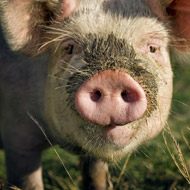Room for improvement on larger farms - study

“Simple adjustments in the management of space allowances and of water supply can also improve welfare.”
Farm animal welfare is not compromised on large farms, but there is room for improvement, according to new research.
The study, published in the journal Animal Welfare, looked at whether farm animal welfare is compromised on larger farms, and if so, how.
Researchers assessed welfare at 60 conventional fattening pig farms in Germany with a range of 250 -11,000 pigs. Using the four basic principles of good feeding, good housing, good health and appropriate behaviour, the researchers found that none of the farm sizes were superior in terms of welfare.
The principle of good feeding scored highest in the study, which was in part due to the fact that only a very limited number of pigs had poor body condition.
Water supply, however, was found to be insufficient on 16 of the farms and a lack of and poorly-functioning drinkers were found across a range of farms. One farm recorded a maximum number of 43 pigs per drinker - far more than the threshold of 12 per drinker required to meet German legislation.
Good health scored the lowest of the four principles. Moderate wounds was the third most common indicator of poor welfare and there was also a high frequency of bursitis, wounds and manure on the pigs.
Appropriate behaviour also recorded low in all the farm sizes. In more than 40 per cent of the pens, space allowances were below German Farm Animal Welfare Regulations. Overcrowded pens were recorded on 92 per cent of farms, although the proportion of overcrowded pens was lowest on large farms.
“Our study did not show that farm size was a factor for the animals’ welfare, however, the high occurrence of bursitis and soiled animals, which are known to be affected by floor type and quality, underline the necessity of improving the quality of floors and of climate management,” explained study author Dr Christian Lamberts of the Research Institute of Organic Agriculture (FiBL).
“Simple adjustments in the management of space allowances and of water supply can also improve welfare.”



 The Animal and Plant Health Agency (APHA) has updated its online reporting service for dead wild birds.
The Animal and Plant Health Agency (APHA) has updated its online reporting service for dead wild birds.